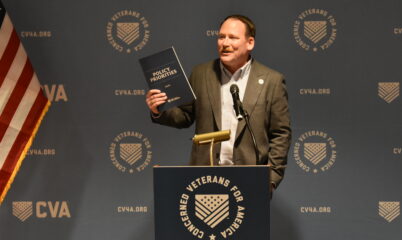CVA URGES CONGRESS TO PASS COMPLETE THE MISSION ACT FOR VETERANS’ HEALTH CARE CHOICE
Grassroots veterans group supports legislation that would hold VA accountable to uphold its mission to veterans
ARLINGTON, Va. – Concerned Veterans for America (CVA) Strategic Director John Byrnes issued a statement following Chairman Bost’s introduction of The Complete the Mission Act of 2024 – a bill that would protect veterans’ health care choices from bureaucratic meddling and hold the U.S. Department of Veterans Affairs (VA) accountable for improving veterans’ awareness of and access to their preferred treatment choices – even when that treatment is not at a VA facility:
“The Biden administration’s VA under Secretary Denis McDonough has failed our nation’s heroes for nearly four years by not holding top officials accountable to act with integrity and uphold the VA’s mission to treat the veterans they vowed to serve.
Despite the VA MISSION Act being signed into law in 2018 by President Trump, current VA leadership supports bureaucratic barriers to veterans’ access to community care – access that the VA MISSION Act law authorizes.
Biden’s VA is riddled with the worst malfeasance we’ve seen in over a decade since the deadly 2014 Phoenix VA scandal when veterans died while waiting for care on secret wait lists. Considering ongoing misconduct, an ongoing veterans’ mental health crisis, and the VA’s failure to provide veterans with lifesaving community care options, our message to the Congress is clear: Veterans deserve health care choice and VA officials must be held fully accountable for not carrying out the MISSION Act. The Complete the Mission Act of 2024 would do just that. Our veterans’ lives and wellbeing depend on it.”
Background
If passed, the proposed Complete The Mission Act of 2024 would implement:
- Codified access standards: Codifies existing community care access standards in place since 2019 to provide veterans greater certainty about their health care options.
- Community care eligibility and status outreach: Requires the VA Secretary to inform veterans of their community care eligibility. If referrals are denied, the bill requires the VA to inform veterans about why and how to appeal.
- Self-scheduling portals: Requires the VA to develop online portals allowing veterans to self-schedule appointments at VHA facilities or at community care providers, allowing them to receive appointment reminders, track referrals, and appeal decisions.
- Full choice pilots for mental health, substance abuse: Creates a three-year pilot offering veterans access to outpatient mental health and/or substance use treatment through community care without prior VA referral.
- Longer claim, reimbursement deadlines: Extends community care providers’ deadlines for submitting claims for reimbursement from 180 days to 1 year, per industry standards.
- Telehealth outreach: Requires the VA to discuss telehealth choices with veterans when it is an available and appropriate treatment option, while ensuring that telehealth is not abused to satisfy VA wait-time targets for in-person care.
- Accurate wait times: Requires the VA to measure wait times from a veterans’ date of request for an appointment to the date they receive care, as already stipulated in MISSION Act regulations but currently ignored by the VA.
- In-patient mental health referrals: Creates a standardized process to refer veterans for priority or routine admission for in-patient mental health care, ensuring that veterans are able to choose between VHA and community care facilities based on existing eligibility access standards.




